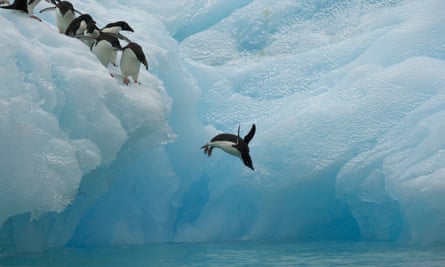A year ago, Amitav Ghosh usefully stirred things up with his rebuke to “realist” modes of writing. Where, he asked, is all the fiction about climate change? Well, it turns out that the answer is science fiction. Genre writing has been exploring the possible futures of climate change for many years, and 2017’s three best novels engage in powerful and varied ways with precisely that subject. Kim Stanley Robinson is the unofficial laureate of future climatology, and his prodigious New York 2140 (Orbit), a multilayered novel set in a flooded Big Apple, is by any standard an enormous achievement. It is as much a reflection on how we might fit climate change into fiction as it is a detailed, scientifically literate representation of its possible consequences.
Just as rich, though much tighter in narrative focus, is Paul McAuley’s superb Austral (Gollancz), set in a powerfully realised near‑future Antarctica transformed by global warming. Jeff VanderMeer’s vividly weird Borne (4th Estate) takes a different, neo-surrealist approach to the topic. You won’t soon forget its star turn, a flying bear as big as a cathedral rampaging through wastelands.
These are novels that show how environmental change is a global phenomenon, and nowadays SF is written all over the world. Bangladeshi author Saad Z Hossain’s Djinn City (Unnamed) is set both in his home country and the realm of the Djinns. It’s a richly evocative adventure about a father and his half-Djinn son searching for one another – a sort of dark-fantasy Finding Nemo, as charming and funny as it is inventive and strange. Jennie Melamed’s frosty dystopia Gather the Daughters (Tinder) reads like The Handmaid’s Tale crossed with Lord of the Flies, and manages to extract some sharp-edged hope from its story of an island community where men rule and women are ruled. Deji Bryce Olukotun’s After the Flare (Unnamed) is pacy Nigerian-set SF in which a supermassive solar flare has knocked out the world’s electrical generation, and attempts to restart the space programme are haunted by what may be alien presences. Vividly written and smartly realised, this is only Olukotun’s second novel: he is a rising star.
In Rivers Solomon’s An Unkindness of Ghosts (Akashic), a generation starship has left the ruined Earth behind: the senior crew are all white supremacists, while dark-skinned people are kept below decks as slave labour. In this unflinching debut Solomon invites comparisons with Octavia Butler. And to return to the UK, Nina Allan’s The Rift (Titan) is the sort of novel that settles into your mind and refuses to leave it. Sisters Selena and Julie are close, but Julie is (it seems) abducted from their Cheshire village as a teenager, returning years later, telling strange tales of where she has been. This is a beautifully judged work that interweaves the textures of ordinary life with an alien fantasy realm, to produce a profoundly touching narrative about the costs of recovering what has been lost.

In the wake of the success of Game of Thrones there has been no shortage of commodified genre fantasy, but the best writing in this mode is far richer and stranger than the commercial norm. Jeannette Ng’s Under the Pendulum Sun (Angry Robot) is an opulently atmospheric piece of neo-Victorian fantasy set in a 19th century in which the British are sending missionaries to Fairyland. It’s a strange, brooding and occasionally perverse debut. Mark Alder’s Son of the Night (Gollancz) completes the medieval fantasy dyad begun with Son of the Morning: The Hundred Years War, in which devils and angels fight alongside men, and where hell is as real a location as France, if rather nastier.
Increasingly, though, writers of fantasy are leaving Europe behind, or mixing it up, as a template for their imagined worlds. Elizabeth Bear’s The Stone in the Skull (Tor), the first in a new series, is set in “the Lotus Kingdoms”, her east-inflected fantasy world. French-Vietnamese author Aliette de Bodard draws on both sides of her heritage in The House of Binding Thorns (Gollancz), bringing to life an alternate Paris blasted by a magical war whose ruins are populated by noble angelic houses, magicians and alchemists and also by some splendid oriental-style dragons. And this year NK Jemisin brought her Broken Earth trilogy consummately to a close with The Stone Sky (Orbit). Pitched somewhere between SF and genre fantasy, it brilliantly uses the intricate portrayal of an afflicted supercontinent as a way to reflect on how we all construct worlds out of our families, identities and societies. The first two volumes won the Hugo for best novel in 2016 and 2017 and there’s a good chance The Stone Sky will complete an unprecedented hat-trick for this extraordinary author.
But perhaps the most heartening thing for fans of SF is how hospitable to gonzo experimentalism the genre remains. China Miéville’s novella The Last Days of New Paris (Picador) is an elegantly puzzling piece of experimental surrealism. In Amatka (Vintage) Karin Tidbeck has written an unforgettable dystopian novel set in a reality where objects must be named, repeatedly, to stop them dissolving into ooze: equal parts Le Guin, Kafka and Borges. And then there is Gnomon (William Heinemann), Nick Harkaway’s most ambitious novel yet. This story of near-future mass surveillance, artificial intelligence and human identity reads as if 11 novels have been crowded into a matter-transporter pod, emerging on the other side weirdly melded. An enormous, shaggy, infuriating, amazing and quite unforgettable piece of fiction, it’s the kind of thing only science fiction can do.

Comments (…)
Sign in or create your Guardian account to join the discussion